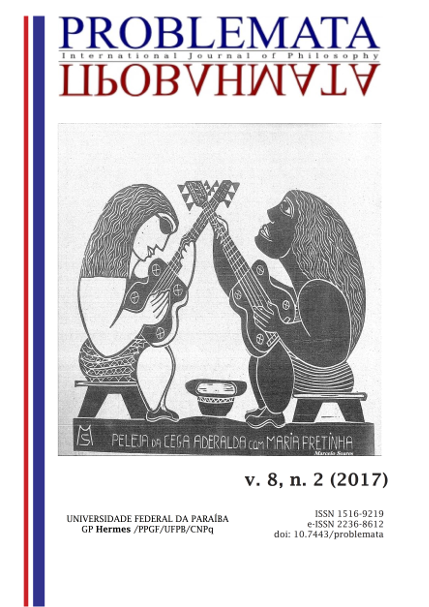KAREN WAREN: LA ÉTICA ECOFEMINISTA
DOI:
https://doi.org/10.7443/problemata.v8i2.30756Keywords:
Ética, ecofeminismo, ecología, medio ambiente, feminismoAbstract
El ecofeminismo social de Karen Warren es una de las aproximaciones más sólidas a una nueva comprensión de la ética medio ambiental. Su categoría analítica ‘lógica de la dominación’ permite articular la teoría feminista y ecológica en los debates éticos contemporáneos, cuestionando el antropocentrismo y postulando una versión renovada de valores, principios y agentes morales. El ecofeminismo de Warren es vital no sólo para comprender la subordinación de las mujeres, los animales y la tierra, sino para el desarrollo de teorizaciones y prácticas ecológicamente responsables y socialmente justas para todos. Este artículo de reflexión tiene como objetivo efectuar una aproximación al ecofeminismo de Karen Warren explicando qué son la lógica de la dominación y los marcos conceptuales opresivos, además de identificar cuál es la alternativa ética que postula y sus limitaciones.Downloads
References
ADAMS, C. Ecofeminism and the eating of animals. Hypatia, v. 6, n. 1, p. 125, //Spring91 1991. ISSN 08875367. Disponível em: < http://ezproxy.uniandes.edu.co:8080/login?url=http://search.ebscohost.com/login.aspx?direct=true&db=hlh&AN=9105130453〈=es&site=eds-live&scope=site >.
GANDON, A.-L. L'écoféminisme: une pensée féministe de la nature et de la société. (French). Ecofeminism: Feminist Theories of Nature and Society. (English), v. 22, n. 1, p. 5, 06// 2009. ISSN 08384479. Disponível em: < http://ez.urosario.edu.co/login?url=http://search.ebscohost.com/login.aspx?direct=true&db=edo&AN=42311504〈=es&site=eds-live >.
GLAZEBROOK, T. Karen Warren's ecofeminism. Ethics & the Environment, v. 7, n. 2, p. 12, 2002. ISSN 10856633. Disponível em: < http://search.ebscohost.com/login.aspx?direct=true&db=eih&AN=7733400&lang=es&site=eds-live >.
GÓMEZ, L. F. Fundamentos de ecoética. Académica colombiana de ciencias veterinarias, v. 2, p. 11-31, 2010. ISSN 22159800. Acesso em: 12 Agosto 2014.
LEOPOLD, A. La ética de la tierra. In: VALDÉS, M. (Ed.). Naturaleza y valor. México: Fondo de cultura económica, 2004. p.25-44.
PULEO, A. Ecofeminismo para otro mundo posible. Madrid: Cátedra, 2011. 439.
RUETHER, R. R. Deep Ecology and World Religions : New Essays on Sacred Grounds. In: (Ed.). SUNY Series in Radical Social and Political Theory. New York: State University of New York Press, 2001. ISBN 9780791448830
SAGOLS, L. El ecofeminismo y su expresión en la filosofia de Karen Warren. Una perspectiva ética. Debate Feminista, v. 49, n. 25, p. 116-124, 2014. ISSN 01889478. Disponível em: < http://search.ebscohost.com/login.aspx?direct=true&db=a9h&AN=96319869〈=es&site=eds-live >.
TRIANA, D. Éticas ecofeministas: la comunidad de la vida. Cuadernos de Filosofía Latinoamericana, v. 37, p. 117-131, 2016. ISSN ISSN 0120-8462.
WARREN, K. Chapter 8: Care-sensitive ethics and situated universalism. In: (Ed.): Taylor & Francis Ltd / Books, 1999. p.131-145. ISBN 9780415197366.
______. Filosofías ecofeministas. Barcelona (España) Icara 2003, 2003. ISBN 8474266831. Disponível em: < http://ez.urosario.edu.co/login?url=http://se. >.
WARREN, K. J.; CHENEY, J. Ecological Feminism and Ecosystem Ecology. Hypatia, v. 6, n. 1, p. 179-197, 1991. ISSN 08875367. Disponível em: < http://www.jstor.org/stable/3810040 >.
Downloads
Published
Issue
Section
License
Authors who publish with this journal agree to the following terms:
- Authors retain copyright and grant the journal right of first publication with the work simultaneously licensed under a Creative Commons Attribution License that allows others to share the work with an acknowledgement of the work's authorship and initial publication in this journal.
- Authors are able to enter into separate, additional contractual arrangements for the non-exclusive distribution of the journal's published version of the work (e.g., post it to an institutional repository or publish it in a book), with an acknowledgement of its initial publication in this journal.
-
- Authors are permitted and encouraged to post their work online (e.g., in institutional repositories or on their website) prior to and during the submission process, as it can lead to productive exchanges, as well as earlier and greater citation of published work (See The Effect of Open Access).





